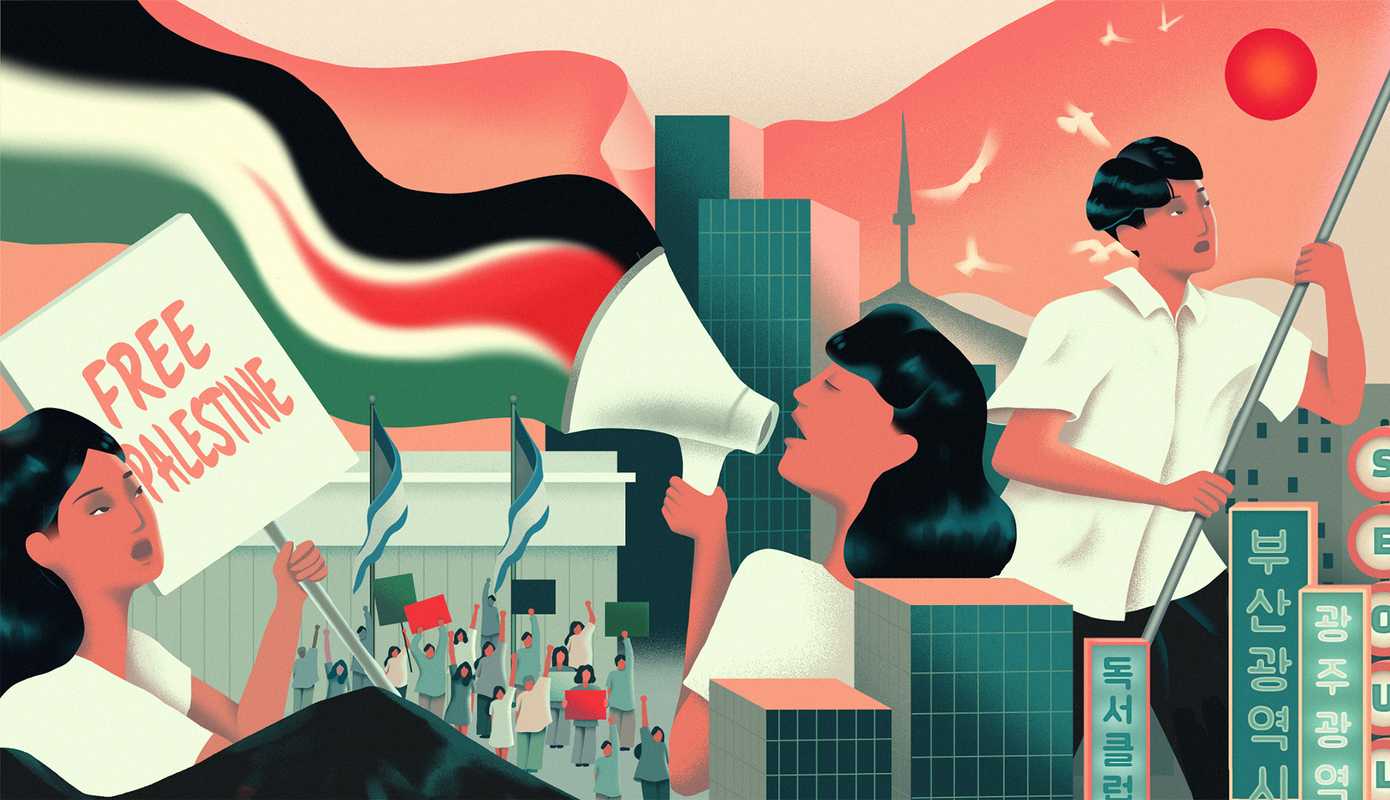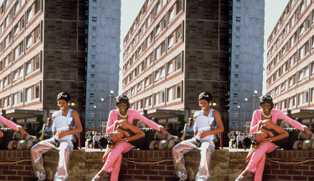In my home country Korea, when movements reach out to people for actions – anything from people power at protests to signatures on petitions or direct actions – we ‘request solidarity’ (yeondae-yochung). It’s a call not just to action, but to understanding and empathy for the past and future of a cause.
In May 2021, one such request for solidarity caught my eye – an open letter to the Israeli government entitled ‘Israel, Stop invasion of the Gaza Strip immediately.’ Around 160 Korean civil society organisations signed it, and the range of causes that the signatories represented was strikingly broad: Climate Justice Forum; Friends of “Comfort Women” in Sydney; Korean Deaf LGBT; Korean Solidarity against Precarious Work; People Making Jeju a Demilitarized Peace Island; Book Club, Hyanglin Church.
Elsewhere in the world, we were seeing one of the largest ever international uprisings in solidarity with Palestine. Hundreds of thousands of people across Europe and the Americas took to the streets, as Israeli forces launched intense military strikes across Gaza, the West Bank and historic Palestine in response to Palestinian resistance against ethnic cleansing and evictions in the Jerusalem neighbourhood of Sheikh Jarrah.
In the UK and the United States in particular, two countries deeply complicit in the design and continued support of the architecture of occupied Palestine, the size of the protests was unprecedented. Those of us on the streets in the UK, where I currently live, were speaking from the very heart of the British Empire, whose colonial policing units had trained proto-IDF forces in the 20th century, and whose government continues to sell arms to the Israeli military. Perhaps in response to the complicity of its government, the UK is home to longstanding and prominent solidarity movements with Palestine.
Korea too, has a long and vibrant history of social justice movements, but despite the global attention on the atrocities being committed in occupied Palestine at this time, the show of solidarity from my home country surprised me. I had always thought of Korean political organising as more domestic in scope – stretching from anti-colonial movements during Japanese occupation, to democratisation and workers’ rights in the military dictatorships, to mass protests in 2017 that led to the impeachment of a corrupt president.
The South Korean organisations that participated in the open letter for Gaza were called to solidarity by a group called Palestine Peace & Solidarity in South Korea, or, directly translated, ‘Palestine Peace Yeondae’. This small group meets every week in an office near Hapjeong Station in Seoul. It organises sit-in protests outside the Israeli embassy, ‘Free Palestine’ film festivals, and online workshops about the BDS movement. They take the Palestine flag to Korea’s Queer Pride festival every year.
I realised this open letter wasn’t just a temporary flare of sympathy from an unlikely corner of the world. In Korea, there is a small but growing awareness that our own historical and current plight of occupation, division and militarisation is inextricably linked to the condition of occupied peoples all over the world. Although the Korean and Palestinian situations are unique, in the act of yeondae, or the connecting of our movements and histories, we can begin to understand the pathway to our collective liberation.
***
Like the establishment of the state of Israel in historic Palestine, Korea’s history of militarised borders originated in the US imperialist politics of the Cold War era.
In 1945, Korea was liberated from 35 years of brutally extractive Japanese colonial rule and promptly divided in two, with Russia occupying the north and the US occupying the south. At first, citizens could still cross between north and south. Then ‘border officials’ were put in place and started requiring documents. As the Cold War intensified, border checks became more stringent, the checkpoints more militarised. People who had family, friends or work on the other side of the border endured increasingly time-consuming and humiliating experiences when moving around in their home.
After the Korean War (1950-1953) ended, the border was solidified. Today, miles and miles of barbed wire are visible from the road if you drive just 30 minutes north out of Seoul. Yet the mountains and the rivers visible on the other side of the most militarised border in the world make the same silhouettes that their siblings do in the south.
It is bitterly ironic, therefore, that the South Korean government – of a country that itself was colonised and occupied until the mid-twentieth century – is now funding a settler colonialist state that is illegally occupying territory and imposing armed checkpoints that restrict the movement of Palestinians in their own historic homeland.
Want to support more storytelling like this? Become a Skin Deep member.
The South Korean and Israeli governments are close allies, often sharing military tactics and weapons; in 2019, Israeli President Reuven Rivlin met with the South Korean government to promote the use of Israeli missile defense systems against the North Korean threat. In May 2021, as Israeli bombs were falling on Gaza and the West Bank, South Korea signed a free trade agreement with Israel. And of course, South Korea’s biggest ally is the US, the world’s largest funder of Israel’s military.
South Korean citizens undoubtedly benefit from our government’s close proximity to global centres of power – the US chief among them. They are ‘citizens’ for one, whereas our brothers and sisters in Palestine cannot even claim this fundamental right for themselves. But as citizens, we Koreans only enjoy our freedoms because our government is complicit in the American imperialist project that was a key architect in the creation of our broken and divided country.
Koreans continue to live under the long shadow of global empire. To this day South Korea does not control its own military, requiring US approval to deploy forces. The centre of Seoul is home to one of the biggest US military bases outside of US territory. Itaewon, a district now populated by cafes and nightclubs, used to house brothels for exclusive use by US soldiers. Meanwhile, South Korean soldiers – many of them young men who are doing compulsory military service – guard the fortress-like US embassy in Gwanghwamun Square.
What if South Koreans looked to the struggle of the Palestinian people as a lesson to learn for our own liberation? Palestine is in a seemingly more impossible situation than any colonised land, its people officially ‘stateless’, policed at every turn in their own home. Yet they are still fighting, generations handing down the decades-long struggle both in occupied Palestine and among the Palestinian diaspora.
Many Koreans see their country as it is now – the centre of our cities dominated by US military bases, our land divided by the most heavily armed border in the world, a loud silence coming from our families to the north – as permanent and unchangeable. But perhaps the intergenerational Palestinian struggle for liberation and sovereignty should teach Koreans and other peoples to examine their own histories of occupation and division, and to not simply accept their current condition.
***
The solidarity work of groups like Palestine Peace Yeondae shows the cracks in the imperialist armour that coats modern South Korea’s vision of itself. In May, as the South Korean government was signing its new free trade agreement with Israel, activists logged on to the livestream of the signing ceremony and bombarded the live chat with questions about the massacre of Palestinians. The Ministry of Trade, Industry and Energy was forced to shut down the comments section.
Beyond direct actions like these, Palestine Peace Yeondae’s work is also centred on education, longevity and imagination. Film festivals are held every year on the anniversary of the Nakba, and films made by Palestinian artists are shared online thoughout the year in the form of links or Zoom events. Activists from Palestine Peace Yeondae consistently attend the Wednesday Protests for the Comfort Women, a weekly protest running since 1992 (they recently held their 1500th demonstration) to demand reparations for the women who were kidnapped into sexual slavery during WWII. At these weekly gatherings they share lessons on how the lack of acknowledgement for historical state-sanctioned violence against comfort women (not only Korean women but also from China, the Philippines and countless other occupied Asian territories) is intertwined with and exacerbates violence against women in occupied Palestine, who endure the dual blow of patriarchal and imperialist violence.
Weaving these struggles together – acknowledging their differences but also their shared roots in a global architecture of oppression – allows these movements to sustain their longevity. We cannot be free by solving just one of these issues; our liberation depends on the alliance of all these movements.
Amidst over half a century of sustained occupation, 2021 stands out as one of the most violent and traumatic years to date for Palestinians. The UN reported that 256 Palestinians were killed during 11 days of bombing in Gaza. Damage inflicted during this time destroyed almost 50% of the water network and left 800,000 people without access to clean water.
As the latest mainstream media frenzy dies down, we cannot let the devastation that Palestinians have faced this year be forgotten. Activist movements globally should be striving for solidarity in the form of mutuality: an understanding that fighting for Palestinian liberation is not just a matter of empathy but, in fact, solidarity with the cause is vital to our collective survival and liberation from global empire. Our histories are all unique, but by learning from each other’s struggles, we can find in ourselves a language for imagining our collective liberation and an emancipated vision of the world.
Stay in touch. Subscribe to Skin Deep’s monthly newsletter.




.%20photo%20by%20Helen%20Murray.jpg)